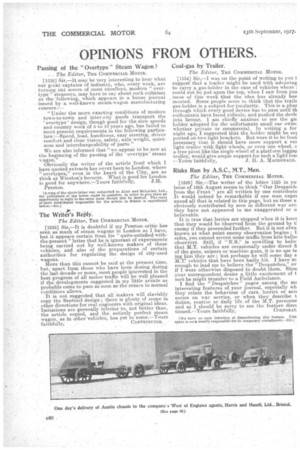OPINIONS FROM OTHERS.
Page 20

If you've noticed an error in this article please click here to report it so we can fix it.
Passing of the " Overtype ' Steam Wagon ? ,• • The Editor, THE COMMERCIAL MOTOR.
[1532] Sir,—It May be very interesting to hear what our groat -captains of industry, who, every week, are • turning -out scores of most excellent; modern " overtype!' steamers, may lia.ve to say about such criticism as the .following, which appears in a house journal . issued by a well-known steain-wagon manufacturing
concern:— • "Under the more exacting conditions of modern town-to-town and inter-city goods transport the overtype ' design, though good for the slow speeds and country work of 5 to 10 years ago, has failed to meet present requirements in the following particulars :—Speed, load, handiness, easy steering, driver comfort and clear vision, safety, axle weight, quietness and interchangeability of parts."
• We are also informed that "we appear to be now at the binning of the passing of the overtype ' steam wagon.' •
Obviously the writer of the article front which I have quotedextracts has never been to London, where " Overtypes," even in the heart of the City, are RH thick as Winston's hornets. What is good for London is good for anywhere.--Yourg faithfully, J,171; Preston.
• [A copF. of the above letter was submitted to Alley and McLellan, Ltd., the publishers of the house organ in question, in order to give them an opportunity to reply in the same issue should this be desired. The reply of their contributor responsible for the article in debate is reproduced helow.—En.]
The Writer s The Editor, THE COMMERCIAL MOTOR.
[1533] Sir,—It is doubtful if my Preston critic has seen as much of steam wagons in London as I have, but it appears certain from his " quitessatisfied-withthe-present " letter that he is ignorant of experiments being carried out by well-known makers of these vehicles, and also of the preparations of certain authorities for regulating the design of city-used wagons. ••• . More than this cannot be said at the present time, • hut iapart from those who have been dozing during the last decade or more, most people interested in the best progress of all motor traffic will be well Pleased • if the developments suggested in my little article as probable come to pass as soon as the return to normal conditions allows.
It is not suggested that all makers will slavishly copy the Sentinel design ; there is plenty. of scope in
. other directions for real engineers with original ideas. Imitations are lenerally inferior to, not better than, the article copied, and the entirely perfect steam wagon,• as in other 'vehicles, has yet to come.—Yours faithfully, CONTRIBUTOR.
Coal-gas by Trailer.
The Editor, THE COMMERCIAL MOTOR.
[1534] Sir,---I was on the point of writing to you t suggest that a trailer might be used with advantag to carry a gas-hdlder in the case of vehicles where could not be put upon the top, when I saw from you issue of this week that the idea has already bee mooted. Some people seem to think that the traile gas-holder is a subject for jocularity. This is a.phas through which every good device has to pass until th enthusiasts have faced ridicule, and pushed the deVic into favour. I am chiefly anxious to see the gal holder adopted for the unfortunate small car owne: whether private or commercial. In writing a for night ago, I suggested that the holder might be Su) ported on two light brackets. But were it to be foun necessary that it should have more support a vei light trailer with right wheels, or even one wheel, o a free pivot like the single wheel of a platform luggay trolley, would give ample support for such a light loaf —Yours'faithfully, J. A. 14ACDONALD.
Risks Run by A.S.C., M.T., Men.
The Editor, THE COMMERCIAL MOTOR.
[1535] Sir,—The writer of the letter 1525 in yo' issue of 16th August seems to think "Our Despatch. from the Front" are all written by one contribute It would indeed be remarkable if one man expei eneed all that is related in this page, but as these a. Obviously contributed by men in different war are they have not appeared to me exaggerated or u believable.
It is true that lorries are stopped when it is knov that they would be Observed-from the ground by tl enemy if they proceeded further. But it is not aIwa known at what point enemy observation begins ; lj sides, you cannot screen some traffic from kite-ballm observers, Still, if " M.," is unwilling to belie that M.T. vehicles are occasionally under direct fi of the guns, Snipers or machine guns, it is no use te ing him they are ; but perhaps he will some day s M.T: vehicles that have been badly hit. I have se enough to lead inn to believe the' Despatches," ev If I were otherwise disposed to. doubt them. Shou your correspondent desire a little excitement of t sort he might transfer to a Field Ambulance.
I find the "Despatches" pages among the nic interesting features of your journal, especially wh they relate the behaviour of cars' lorries or ace( Bones on war service, or when they describe t duties, routine or daily life of the M.T. personne and so I should be Abrry to see the feature discc tinued.—Yours faithfully, ' CORPORAL [We have 110 such intention of discontinuing this feature. Lim: space is °et ;ions.11y responsible for its temporary curtailment.—En.]






















